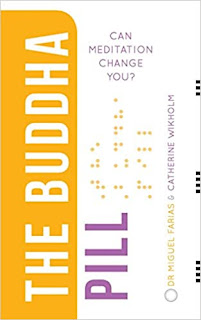by Miguel Farias (Author), Dr Catherine Wikholm (Author)
"Millions of people meditate daily but can meditative practices really make us ‘better’ people?
In The Buddha Pill, pioneering psychologists Dr Miguel Farias and Catherine Wikholm put meditation and mindfulness under the microscope. Separating fact from fiction, they reveal what scientific research – including their groundbreaking study on yoga and meditation with prisoners – tells us about the benefits and limitations of these techniques for improving our lives. As well as illuminating the potential, the authors argue that these practices may have unexpected consequences, and that peace and happiness may not always be the end result.
Offering a compelling examination of research on transcendental meditation to recent brain-imaging studies on the effects of mindfulness and yoga, and with fascinating contributions from spiritual teachers and therapists, Farias and Wikholm weave together a unique story about the science and the delusions of personal change."
" ... When thinking of meditation, most people would assume that the effects could only be positive, and previous research on the topic has been predominantly favourable. There has even been a recent study that suggests that mindfulness-based cognitive therapy (MBCT), which includes meditation as a key aspect, could be a non-chemical alternative to anti-depressants in preventing relapses into depression. In certain circles, meditation has been marketed as somewhat of a panacea – a ‘cure-all’ treatment for a range of mental health issues including stress, depression and anxiety.
However, throughout his years of research, Dr Farias has discovered numerous accounts of less positive experiences. There have been instances where individuals have suffered extreme adverse side effects after practicing meditation. In fact, the effects reported are some of the exact ones that meditation is sometimes prescribed to help with. These include anxiety, depression, panic, confusion, restlessness – and in some cases, psychosis and manic episodes.
The book features numerous case studies of individuals who have been affected negatively following meditation. These range from accounts of group meditation sessions in which one or two participants have became “emotionally disturbed” to reports of a woman who spent fifteen years being treated for psychotic depression, thought to be “triggered” by a three-day meditation retreat." -- The Dark Side of Meditation: New Book Explores the Truth Behind Meditation
http://blogs.coventry.ac.uk/researchblog/the-dark-side-of-meditation-new-book-explores-the-truth-behind-meditation/


No comments:
Post a Comment